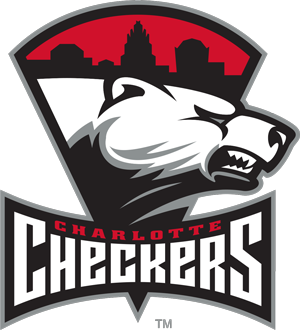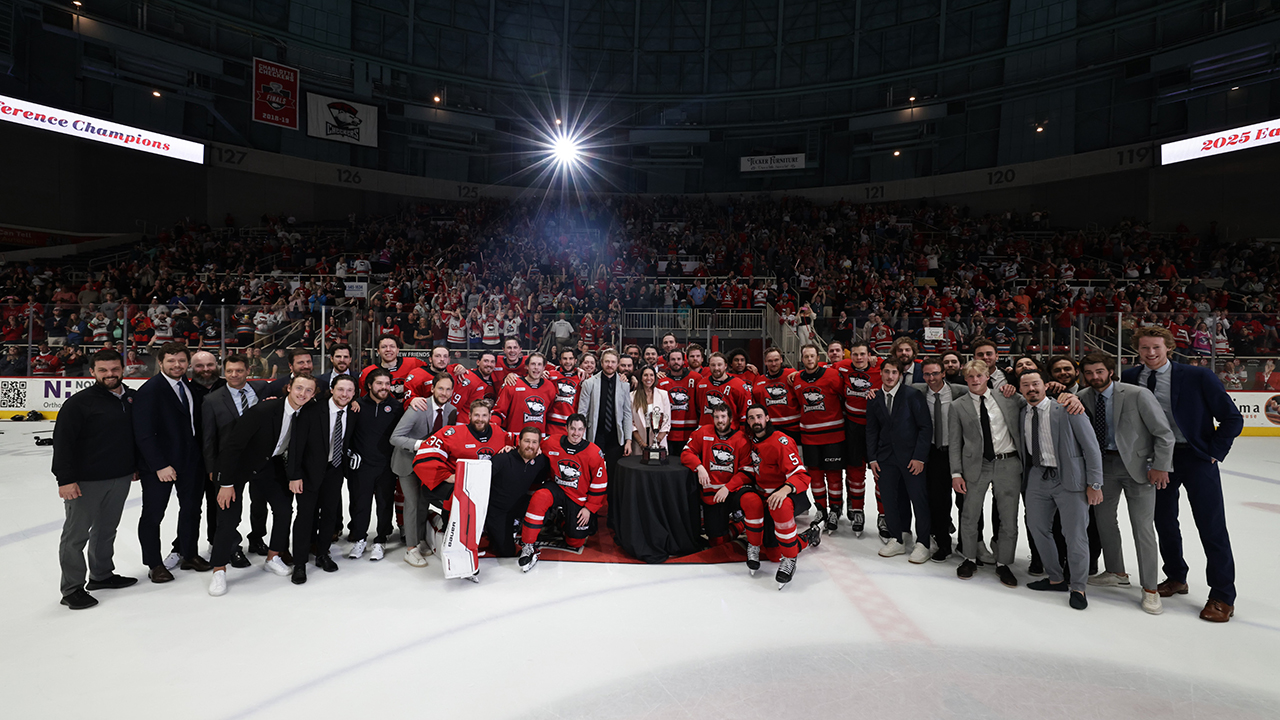At the end of the 2024-25 season, the Calder Cup was awarded on the Bojangles Coliseum ice.
Unfortunately, the Checkers were the ones watching the celebration from across the rink as the Abbotsford Canucks hoisted the trophy following a Game 6 victory to close out the series.
“When you go that far and you ultimately don’t get the job done, it kind of leaves you with a little bit of a sour taste,” said Checkers forward Justin Sourdif. “You move on from it but you never forget it.”
It was a heartbreaking end to what had been a stunning run for the Checkers - a team that battled until the final week of the season to secure a first-round bye and then went on a tear to take down three behemoth squads to win an Eastern Conference title.
“I don't know if it's enough time to digest, to be quite honest,” said head coach Geordie Kinnear at Wednesday’s exit meetings. “But you don't get two wins away from winning it all without a special group.”
The fact that this group made a run to Game 6 of the Finals is a feat in and of itself, but it becomes even more impressive when running down the injury turmoil they faced.
Aidan McDonough (16 points in 16 games) and Ryan McAllister (15 in 16) were off to red-hot starts when they both suffered season-ending injuries in the same game Nov. 29. MacKenzie Entwistle missed a month early on in the year, came back for five games and then was sidelined for the rest of the regular season on Dec. 7. A promising start to Riese Gaber’s rookie season was halted with a season-ending injury on Dec. 12. After getting hurt on opening night, team captain Zac Dalpe played eight games before an injury ended his season on Dec. 18. Mitch Vande Sompel had his campaign cut short after the Dec. 29 game due to injury.
That string of catastrophic injuries would be enough to sink any team’s season. But the Checkers refused to be knocked off course.
“With everything that’s been thrown at us this year, I’m super proud of the group,” said Checkers alternate captain Rasmus Asplund. “I’m proud of the guys and the way we battled.”
“Everyone came in and we were willing to work, willing to stick together and do whatever it took, no matter what,” said Checkers forward Kyle Criscuolo.
The drive to overcome anything in their way was a byproduct of a culture that permeated its way through the Charlotte locker room.
“We talked about the environment being kind of the separator,” said Kinnear. “It allowed all the younger players to thrive, be the best version of themselves and feel trust. Trust comes from feeling safe, and I felt like it was a very safe environment, which allowed the younger players to trust everybody and just go out and play hockey.”
That culture is something that has been building in the organization, even through all the roster iterations that have passed through the halls.
“In the American Hockey League the changeover is so great year after year,” said Kinnear. “But I think if you really look at it, those core guys that have been here for the last little while, deserve a lot of credit.”
Even as they navigated a tidal wave of injuries, Charlotte has one more twist coming its way in the form of a new starting goalie.
At the NHL trade deadline, Florida shipped Chris Driedger to Winnipeg in exchange for Kaapo Kahkonen, and the Checkers - who had been rotating through the trio of Driedger, Ken Appleby and Cooper Black - introduced a new netminder to the mix in mid-March. The rare move of adding a new starter late in the year came with Charlotte fully throwing its trust onto him - the veteran played in 12 of the last 18 regular-season games and was between the pipes for every minute of the playoff run - and it paid off.
“I think that was a part of the missing piece for us,” said Kinnear of acquiring Kahkonen. “Having such a young group at the back end, you need an experienced goalie that's done that before that has that calmness and composure, and he needs to be your best player. He provided that for us in the group. I thought he came in and was very detailed, very structured, very organized and a very elite athlete.”
Amidst all of the moving parts throughout the season, everything came together in the room to forge a group that many players called the closest they’ve ever been a part of.
“It’s definitely a really special group of guys here and it let me feel welcome here as a rookie,” said forward Sandis Vilmanis. “It was super fun to play with them and super fun to spend time with them.”
“It was a culture of so many mixed personalities that came together and jelled very well,” said forward Will Lockwood. “I think everyone had a little role that they brought to the table, even if it was a first year guy, I feel like everyone brought a special mix to the table. That made coming to the rink so much fun everyday.”
“It was just the most fun group I’ve ever been a part of,” said forward John Leonard. “I think that’s kind of the thing we’ll take the most away from this group is just how fun it was to be around the rink every single day, the attitude everyone came with.”
Off the ice, this team thrived in a tight-knit environment, but that was only half of the recipe for success.
On the ice, this version of the Checkers was an impressively well-rounded squad - finishing as one of only three teams in the AHL to boast a top-10 power play (5th), penalty kill (1st), offense (9th) and defense (t-5th) - that fully bought into the identity that the coaches were preaching.
“We want to be an extremely tough group to play against,” said Kinnear. “Toughness isn't necessarily fighting. It's shift after shift, not giving a lot of space, being hard where you need to be hard. You look at Game Five versus Providence, I don't think there's too many teams that have played a playoff game against an elite team and gave up eight shots. I think you look at Game Two of the Finals, we give up 13 shots. That's not easy to do, because these teams are not easy teams, they’re the best of the best. And so the recipe’s there, we just fell short.”
One of the biggest things that jumped off the page when looking at this team’s stats was their special-teams success during the regular season. The power play was formidable, but the aggressive penalty kill became Charlotte’s calling card. The Checkers not only finished with the best kill in the league by nearly a full percentage point, they scored a league-leading 16 shorthanded goals.
“When I used to kill penalties, or used to coach it in the past, it was always to prevent,” said Kinnear. “We talked a little bit more about having a reflection of five-on-five, where we wanted to have more tempo and pace on it.”
The approach paid off in spades for Charlotte. Seven different skaters scored a shorthanded goal and three different Checkers - Leonard, who set a franchise record and led the league, Asplund and Patrick Giles, who was traded to San Jose at the deadline - all ranked in the top seven of the AHL in that category.
“There developed chemistry with the forwards - Sourdy [Justin Sourdif], Willy Lockwood, Aspy [Rasmus Asplund], Lenny [John Leonard], early on in the year Megs [Jaycob Megna], Kiersty [Matt Kiersted], Tobi [Tobias Bjornfot], they were staples back there. But what was impressive was when we lost those guys, it never really went away. I think everyone bought into it, and they were students of the game, too, so a lot of guys weren't getting kill time, but they were in the meetings and probably watching on the ice, and for me, that was the difference. We wanted to kill with tempo, and I think we got that.”
Unfortunately for Charlotte, that special teams magic ran out as the postseason wore on. The Checkers went 7-for-66 on the man advantage across the playoffs and 4-for-23 in the Finals compared to Abbotsford’s 7-for-20 mark.
“I think the longer you go, the more demanding things are,” said Leonard. “Special teams in general are always going to be such a crucial part, especially in the postseason, and yeah, looking back at it now, obviously the power play did struggle. You know, Abbotsford was great. Great kill, they had a great power play, and credit to them.”
Given the journey that this team embarked on this season, the ending was an especially painful gut punch to a group that had poured so much into this run. And while watching across the rink as your opponent celebrates a championship victory is a brutal task, it can also be used as fuel.
“You just remember that feeling and how much it stings and how much it took to get there,” said Lockwood. “I think a lot of teams get close before they get there. It’s an unreal thing that everyone here got a taste of what it takes to get to that final game.”
After coming within two wins of the ultimate prize, the end goal remains the same for the Checkers - bring the Cup to the Queen City.
“I'm a student of the game,” said Kinnear. “The one that stuck out to me was Bruce Cassidy with Vegas [in 2023]. All he talked about was that he just wanted to win one. ‘I just want to win one, just want to win one.’ So that's kind of my mindset. I just want to win the first one. We were two wins away, so my hunger is real and it will never go away until I win that one. That's my goal.”





